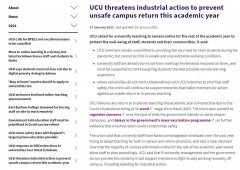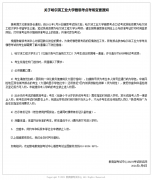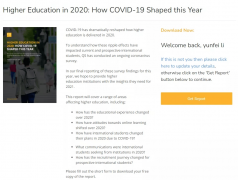英国论坛
Lesson One: Tackling the Question
Think of the essay as the face of your application. An application without an essay is a statistic—just another fa
celess person in a crowd. An application with a poorly written essay does not give admissions officers the chance to care about you. Use simple psychology: make them feel that they know you, and it will be harder for them to reject you.
Make them know you AND LIKE YOU, and they might accept you despite your weakness in other areas. Understanding the importance of the essay is a necessary first step toward perfecting your application. If you are normally a procrastinator, you should understand that your success depends entirely on the amount of time and effort you put into the essay writing process. If all of this has you sweating, you can relax now. Taking this process seriously is the first step. This course will help you get through the other steps.
Admissions essay questions tend to be very broad and difficult to tackle. Yet, it is imperative that you actually answer the question in your essay. It should go without saying, but if your essay does not address the question, then everything you learn in the rest of this course is for naught.
While looking at your application, you are probably asking yourself: “Why in the world are these admissions people asking me this question? What do they want me to write about?” While there is no one answer to either of these questions, there is some reason behind the most popular questions posed by applications.
Law School Statement Strategies
Please select from the following common law school statement themes. Please note: these themes are not mutually exclusive. The best statements incorporate more than one theme.
Why I Want To Be A Lawyer? Why I Am Qualified? Why I Am An Exceptional Person ? Issues-Based Essays ? General Application Questions ?
Theme 1: Why I Want To Be A Lawyer
The secret to doing this theme well is to show why you want to be a lawyer. Don’t just say it and expect it to stand on its own. Admissions officers want believable details from your life that demonstrate your desire and make it real to them. Says one admissions officer:
“Although you do get tired of reading it, it’s nearly impossible (and ill-advised!) for an applicant to avoid communicating at some point that: “I want to be a lawyer.” It’s the ones who say only that that rankle. The ones who support the statement with interesting and believable evidence are the ones who do it best.”
One secret to avoiding the here-we-go-again reaction is to keep an eye on your first line. Starting with “I’ve wanted to be a lawyer since…” makes admissions officers cringe. Yes, we know it’s an easy line to fall back on, but these poor people have read this sentence more times than they can count, and it gets old fast. Instead, start with a story that demonstrates your early call to law. Look, for example, at the first paragraph of this essay:
“That’s not fair.” Even as the smallest of children, I remember making such a proclamation: in kindergarten it was “not fair” when I had to share my birthday with another little girl and didn’t get to sit on the “birthday chair.” When General Mills changed my favorite childhood breakfast cereal, “Kix,” I, of course, thought this was “not fair.” Unlike many kids (like my brother) who would probably have shut up and enjoyed the “great new taste” or switched to Cheerios, this kid sat her bottom down in a chair (boosted by the phone book) and typed a letter to the company expressing her preference for the “classic” Kix over the “great new taste” Kix.
In telling the story, this writer demonstrates that the roots of her political activism run deep without having to ever say it. She doesn’t just tell us and expect us to take her word for it-she shows us.
Another approach that is overdone is the “my dad is a lawyer” approach. Some admissions officers said that when the only reason an applicant gives for wanting to be a lawyer is that it is a family legacy, it makes them question not only the motivation but the maturity of the applicant. While this doesn’t mean you need to hide the fact that your parent is a lawyer, it does mean that you should avoid depending on that as your sole reason for wanting to go to law school. If a parent truly was your inspiration, then describe exactly why you were inspired by them, and what you have done to test your motivation in the real world.
Theme 2: Why I Am Qualified
Writing about your experiences in the law field supports both the Why I Want to Be a Lawyer theme and the Why I Am Qualified theme, so it is always a good idea to spend time on the experiences that qualify you as a potential law student.
Direct work experience is always the best, of course, for a number of reasons. For one, it proves your motivation to the committee. For another, it shows that you have the potential for being successful in the field. Perhaps most importantly, it shows the committee that you understand the profession and know what you will be getting into upon graduating. One type of applicant that the committee keeps a wary eye out for is the kind who wants to go to law school but doesn’t have any realistic idea of what lawyers do beyond the glamorized images seen in television and movies.
But you do not need to have had an internship at a law firm to show that you are qualified. Your experience might be political, such as the convention you volunteered to help organize or the campaign you helped raise funds for. Or it can be academic or issues-based, such as the thesis you wrote on law and the Internet. The rule here is, if you have it, use it.
If you have a lot of experience, the bulk of your essay may be spent on this theme rather than on the Why I Want to Go to Law School theme. You should try to relate your qualifications back to your motivation at some point, though, even if it is only a reference. Often, people will do this in a single, concluding sentence. This can be a powerful approach as long as your passion is clearly demonstrated through your description of your experiences. Look at the essay below for an example of this. The writer spends all but the last paragraph of his essay describing his dedication to activism, first by lobbying to have the Confederate flag removed from the Boy Scouts, and later by actions taken as student body president. He doesn’t make a verbal tie-in to his motivation until the last few sentences of his essay:
I sought practical improvements through independent thinking, perseverance, and tenacity in the face of fierce criticism. A legal education would give me tools to better use these abilities. I am not headed to law school on a mission, but I see law as an opportunity to contribute as we build our future.
Admissions Officers’ Pet Peeve: Making Lists
For some candidates the problem will not be that they don’t have enough direct experience to write about; they have too much. The danger inherent in wanting to include all your experience is that space is limited and you can either end up with an essay that is too long, or one that consists of little more than a listing of your activities and accomplishments. Says one officer:
“The essay should never be merely a prose form of a C.V. That’s dry to read, and again, doesn’t offer any additional information about the candidate.”
It is all right to include all the experience you have had somewhere in your essay but keep it short and do it in the context of a story or a personal account using colorful details. After all, you can attach a resume that will list all your jobs and promotions. The essay has the much more important job of bringing these experiences to life.
Also, resist the hard-sell approach. The admissions officers at top schools read so many essays written by extremely qualified applicants that writing a self-serving “I did this, I did that” essay isn’t going to wow them; it will simply make them yawn. You are much better off with a humble attitude. Let your experiences speak for themselves and focus on making your essay personal and interesting instead. Having someone objective read your essay before you send it in will help you discern the kind of impression you are making.
--------------------------------------------------------------------------------
Theme 3: Why I Am Exceptional
If you are different in any sense of the word-if you are an older applicant, a member of a minority, a foreign applicant, an athlete or musician, disabled, or have an unusual academic or career background, use this angle to your advantage by showing what your unique background will bring to the school and to the practice of law. One interesting topic for foreign students, for example, might be to talk about how the education system differs in this country and why they are choosing it over a course of study in their own country and/or language.
Beware, however, that there are instances where playing the diversity card will backfire:
If you are a “student of diversity” then of course, use it. But don’t harp on it for its own sake or think that being different by itself is enough to get you in-that will only make us feel manipulated and it can show that you didn’t know how to take advantage of a good opportunity.
Only people with significant and documentable disabilities should bring them up in the essay. By that I mean not the current popular overdiagnosed disability du jour, which in my day was ADD.
The secret is to tie in your diversity strongly with your motivations or qualifications, or with what you can bring to the class. If you can’t make a strong tie-in, then you might simply make a brief mention of your exceptional trait, background, or talent instead of making it the focus. This can be a very effective approach because it shows that you have enough confidence in your qualifications and abilities to let them stand on their own. It is as though you are simply mentioning the fact that you are blind or a refugee from a war-torn land or a violin virtuoso to add shading to your already strong, colorful portrait.
Some applicants, however, will have the opposite problem and will feel uncomfortable stressing their differences. Career switchers or older applicants, for example, sometimes feel insecure about incorporating their experience into the essay, thinking that they will only draw attention to the fact that the bulk of their experience is in another field. If this sounds like you, remember that your past experience gives you a unique perspective and you can use your essay to turn this into an advantage instead of a liability. Or, alternately, you could stress the similarities instead of the differences and make your diverse job experiences relevant by drawing comparisons between the skills required in your current field and the ones that will be needed in law school.
--------------------------------------------------------------------------------
Theme 4: Issues-Based Essays
Issues-based essays come in many different forms. The best kind of issues-based essays are written by applicants who have a strong passion for a specific cause and can show why the cause is important to them and what actions they have taken to further it. If there is an issue that dominates your thoughts, studies, or activities, it is natural that this issue will also dominate your essay.
Often times issues-based essays focus more on analyzing all sides of the issue rather than taking a stand from one viewpoint. If you do this type of essay well, it will show the committee that you are a person of reason and logic who can make mature, educated decisions based on a thorough analysis of issues. It is not even necessary that you come to any final conclusions-just showing that you can see and analyze all sides of an argument has validity.
The pitfall inherent in any of the above issues-based approaches is that applicants who write about their commitment to a social justice issue without backing it up with real evidence or experience risk appearing insincere. One admissions officer had this comment:
Year after year hundreds of applicants swear by their altruistic motives, yet only 2% of all lawyers graduating in 1991 took jobs in the public sector, protecting the environment, fighting racial inequality, and crusading for rights for the homeless. The majority (over 60%) took jobs in private firms. After a time, you become skeptical.
If your beliefs are genuine, you will be able to support them with clear evidence of your involvement in activities that demonstrate your commitment.
Business School Essay Question Help
Why M.B.A.? Questions
Contribution and Diversity Questions
Accomplishment Questions
Leadership Ability Questions
Hobby and Extracurricular Questions
Role Model Questions
Failure Questions
Very Personal Questions
General Application Questions
Why M.B.A.? Questions
Discuss the factors that influenced your career decisions to date. Please describe your professional goals for the future. How will the M.B.A. experience influence your ability to achieve your goals? (Wharton)
Discuss your career progression to date. Why do you want an M.B.A.? How do you envision your career progressing after receiving the M.B.A.? (Tuck)
Specifically address your post-M.B.A. short- and long-term professional goals. How will Darden assist you in attaining these goals?
Briefly assess your career progress to date. Elaborate on your future career plans and your motivation for pursuing a graduate degree at Kellogg.
What are your post-M.B.A. career plans? (Harvard)
This is the most common type of essay question, asked on virtually every business school application. This question asks you to present, clearly and coherently, your all too familiar reasons for wanting an M.B.A. The questions usually consist of a few distinct parts. Most will ask about your past (How has your career progressed to date? What has motivated you thus far?), your future (How do you envision your career progressing? What are your goals for the future?), or both. All of them expect you to relate the information to your present desire to attain an M.B.A.
Since this is usually the first question asked, this essay will be the first one the officers see when they get your file. Let it create your first impression. It is similar to the moment in an interview when you shake the interviewer's hand and smile. Similarly, your first essay needs to be confident, direct, and to the point. The admissions committee uses this question to ascertain your motivation, maturity, and focus. While undergraduate application essays are understandably fuzzy about career choices and goals, graduate essays should, in contrast, be crystal clear. If you have vague reasons for pursuing an M.B.A., you need to reconsider your decision to apply. Giving a vague response to this question is akin to having a weak handshake and not looking the interviewer in the eye.
You must accomplish a lot in this essay, so pay special attention to structure. You can tackle the question by dividing your answer into three separate pieces. The first can be about your past professional experience. The second can discuss your future career goals. The third can be about the school's particular program. At each step, demonstrate why and how these experiences, goals, or attributes motivate you to get your M.B.A.
Limiting yourself to one career goal is best, if it is general. If you have a couple of different jobs in mind, that is all right, too. However, your reasons for them should be easily inferred or specifically stated. If you are truly unsure of what your goals are (and we cannot talk you out of applying) always admit so honestly rather than make up something. At the very least, though, give credible reasons for your indecision, and explain why you believe that this school's program will help you overcome your ambivalence.
Even if the question does not specifically ask for it, articulate why the particular program makes sense for you given your unique professional and personal goals. To do this well, you must spend the necessary time in introspection and also research the school. When you understand the school's program and positioning, use what you have uncovered only if you can apply it to yourself. Do not write what you think they want to hear. Admissions officers can spot this kind of insincerity from a mile away. They also seek a heterogeneous mix of backgrounds and experiences. Therefore, trying to fashion yourself after your conception of a typical applicant can hurt you even if you do it well. The truer you are to your real motivations and desires, the better your essay will be.
SAMPLE ESSAY:
Discuss the factors that influenced your career decisions to date. Please describe your professional goals for the future. How will the M.B.A. experience influence your ability to achieve your goals? (Wharton)
"stop fooling around, old boy. How would an M.B.A. help you? Better get on with your career.? Tha's what they say. Friends, colleagues, others.
I've heard it all before. If I were you, I would not do it. Don't waste your time, get ahead with your studies as quickly as possible? my professor for experimental physics told me. That was back in ?8, and of course he was not talking about my M.B.A., but about my intention to go to China: Take a special scholarship and go-for a year, to study Chinese, and physics, in China. Get in line, professor. He was just one of many who did not approve of my idea.
But for me, my plan clearly was: A chance, a challenge, and a choice. A chance to open my intellectual door to the world Europeans consider the (psychologically) most distant one from Western culture, and to broaden my view well beyond the usual. A challenge to learn a language Westerners see as one of the most difficult in a compressed timeframe and to adapt to a completely unfamiliar environment-while not letting this impact my overall physics studies timeline. A choice to diverge from the mainstream path to exclusive specialization in a single intellectual realm, not just on a spare time basis-but with serious commitment.
Looking back after seven years, I could not feel more assured that at that time, I made the right choice. My unusual combination of experiences sets me worlds apart from my physics-only ex-fellow students. Working for (Big Consulting Company), (so far) exclusively on international assignments in high tech industries, is the kind of job I had envisioned at that time. I could not have come here without that choice I made back then.
Now I am-on a higher playing field, though-back to square one: Once again, about to make an academic detour form the prescribed path. An unnecessary delay for my career progression.
But stop! Is that at all true? Getting an M.B.A. makes perfect sense for a consultant-after all, most consultants are M.B.A.s. Getting an M.B.A. makes even more sense in my particular case: it is the perfect academic supplement to my physics background-the one I need to become a leading edge high tech consultant. Detailed technology understanding plus profound business and group skills, that is a rare combination which really gets the career rocket roaring. This is certainly true for me, and I think that this is one of my most important and convincing reasons for an M.B.A.
Having spent considerable time and energy studying Chinese and traveling in Asia (and the rest of the world), an exclusively German career certainly is the opposite of what I am interested in. No cozy, warm place in an easy, totally predictable environment. Guaranteed career progression when the guy above me retires. Getting a dog at 35 and the BMW and house that go with it. No thanks.
So what is it I am interested in? I want to be where the guerilla wars of business are fought (the shoestring traveller resurfaces). Where global language and intercultural/personal skills make the difference. Where intelligence translates into quantum leaps (courtesy of the physicist). This is where I can make my best contribution. In short, I want to be where the action and the challenges are.
For the late 20th and early 21st century, this means, in terms of topic, clearly one industry: High Tech (just watch the stock market). I am well equipped for this with my physics background. In terms of region, it clearly means Asia. Through language study and travel exposure, I have come a long way in getting myself prepared. In terms of function, it clearly means strategy consulting. If there is any place better for this than (Big Consulting Company), please let me know.
Thus the reasons why I want to go back to university and do a dual degree in business and East Asian studies are: Get myself a thorough business background to put all the pieces of case experience I have accumulated during my (Big Consulting Company), life in their right places and understand their context. Do the same with all my pieces of Asian studies and travel experiences. Get ready for the real action I want to be a part and a driver of-and satisfy academic ambitions lurking beneath the surface of the 揾ands-on? consultant.
The knowledge I will gain should help facilitate a career change. After extensive work in European High Tech industry, I want to transfer to Asia. Completion of my desired academic program should give me perfect preparation, some initial contacts, and, through a summer internship in Asia, a clear idea of what to expect from working there (in contrast to studying and traveling).
Of at least equal importance, the Lauder/Wharton dual degree program will also give me a clear view on all the options that I have with my very special combination of skills. While I currently cannot imagine going anywhere else but to one of the Asian offices of (Big Consulting Company), after my graduation, I am also realistic enough to understand that there certainly is a number of other opportunities out there which I would be attracted to, but just know nothing about at this time. I am a firm believer in having many options and in exploring quite a few in detail-whatever position you抮e in, there may always be one which is an even better fit with your ambitions and capabilities.
I think it is obvious why I apply to the Wharton School. Among all the leading business schools, Lauder/Wharton is one of the very few offering a serious joint-degree program that makes sense. With its strong international orientation, Lauder/Wharton offers the type of courses I am looking for. With my diverse set of unusual ideas, experiences and capabilities, I would make a most valuable and colorful addition to the student body of Wharton.
So what are my concrete plans for the time after my graduation? Where in Asia can I be a driver the way described above? One extremely attractive option for me would be helping to set up the (Big Consulting Company), office in (Asian Capital). Or one in (Other Asian Capital). Or in Saigon (Cantonese and Vietnamese are no more different than Swedish and German). But frankly, these are just a few options I can pinpoint now-and I am sure that many more will become apparent during my Wharton experience.
After all, my desire to come to Wharton is just another manifestation of the characteristics that made me go to China a couple of years ago: Take the chance to widen your scope. Accept the challenge that goes with replacing narrow security by broad uncertainty. Make the choice to put all your effort into fully developing and playing out your talents.
So I am not going to take my friends?advice. They have their dogs already, and the BMW is ordered. Sorry-I am not ready for that.
COMMENTS:
The writer of this essay begins painting a picture of himself by discussing his trip to China. The fact that he took the trip instead of heeding all the advice others gave him shows determination, maturity, and character without him ever having to say the words. He clearly demonstrates why an M.B.A. makes sense for him generally (as a consultant) and specifically (to supplement his technical background). He pointedly bucks the usual stereotype of, 揋etting a dog at 35 and the BMW and house that go with it.?Instead, the essayist makes his reasons personal and unique by relating them directly to his professional goal of high-tech consulting in Asia. He then spends a paragraph specifically addressing the Wharton program. To demonstrate the sincerity and focused nature of his goals further, he lists a few very specific options that will be available to him once he graduates.
Certainly, his background and experience make him unusual. However, his style makes him stand out. The essayist consistently uses questions to transition to each new point without being distracting. He begins with a question. Stop foolin? around, old boy. How would an M.B.A. help you??Then he carries the theme throughout, But stop! Is this all true? and So what is it I am interested in?Finally, he write so what are my concrete plans for the time after my graduation? Where in Asia can I be a driver the way described above?To every question he asks he gives a succinct and pointed answer. He concludes by subtly reiterating his main points of chance, challenge, and choice. His last sentence adds the final stylistic touch by referring back to the question posed in the first sentence. In doing this, he effectively nails down the impression we have formed about his character-without him ever having to espouse his own virtues directly.
Contribution and Diversity Questions
Your background, experiences, and values will enhance and diversify Kellogg. How? (1-2 double-spaced pages)
The Darden School seeks a diverse and unique entering class of future managers. How will your distinctiveness enrich our learning environment and enhance your prospects for success as a manager?
Every essay question on the admissions application is geared toward the same thing. Committee members want to find out who you are, what makes you different from everyone else, and how you will contribute to the school if accepted. This question asks these things outright. Because it asks so directly what the admissions committee wants to know, this is one of the most common questions you will find. The question has a structure similar to the Why M.B.A.? question. It asks both Why us? and Why you? However, the nature of this question lends itself to a more personal response. Whereas the Why M.B.A.? question asks what you have done, what you want to do, and how that relates to the school, this question asks about who you are and how it relates to the school. The Why M.B.A.? question asks about your experiences, and this question asks about your qualities.
Just as you brainstormed about your experiences, actions, and goals for the first question, brainstorm about your qualities and characteristics for this one. What sets you apart from everyone else? What words do friends and family use to describe you? For some people, the focus of this question will come easily. A minority can choose to focus on their racial or ethnic differences. A person with an unusual professional background may use this question to turn this potential weakness into a strength. Anyone with a particular talent or calling, such as an athlete or a musician, can use that as a topic. Less obvious characteristics can work just as well. Are you one of those people who are forever getting tagged with an identity? Do people say, ou know Chuck, the funny one,or there's Jane, the history buff.?/font>
If you consider yourself to be a fairly typical candidate with a broad range of interests, you may feel nervous about not being able to identify yourself with any one particular activity or defining trait. You should not be worried. Listing the combination of qualities that make you unique is perfectly acceptable. None of your qualities has to be particularly unique by itself-whatever is real and true will work perfectly. What words do people use to describe you? Are you a risk taker? An academic? A leader? Unusually goal oriented? Dedicated? Ethical? A good team player?
The qualities you choose to describe are not nearly as important as how well you back them up. Because this answer tends to contain many adjectives, you absolutely must provide solid examples demonstrating each quality you have listed. You can take examples from either your work or your personal life. You can even be creative and take an example from your childhood, if you wish, as long as whatever you choose effectively proves that you are what you say you are.
Because this question asks how will you contribute to our school?it provides you with a perfect opportunity to prove that you have researched and targeted yourself to the particular school. Match your distinctiveness in whatever way is natural to the distinctiveness of the program. Show the admissions committee that you are not just perfect for business school in general, you are perfect for their business school.
SAMPLE ESSAY:
Your background, experiences, and values will enhance the diversity of Kellogg抯 student body. How?
During my senior year in college, my father was diagnosed with terminal skin cancer. Like most cancer patients, he spent the majority of his time in the hospital; he often spoke of how nice the staff was, and how much his stay was enriched by the services offered by the volunteers. I felt a great debt to those people who helped my father and mother during that difficult time, and I wanted to do the same for other people in similar situations.
When I moved to New York after graduation, I decided to volunteer at the Sloan-Kettering Memorial Hospital until I found a job. Over the next few months, I worked thirty hours a week helping patients and their families. One of the most rewarding experiences at the hospital was organizing patient voting for the 1992 Presidential election. I was responsible for coordinating the procurement and distribution of absentee ballots with nurses, patients, hospital staff, and the various voting administrations within the five boroughs of New York City.
The response was overwhelming. The patients were overjoyed to be included in the voting process. I knew from my father that the most demoralizing circumstance of a prolonged hospital stay was the feeling that the world was passing you by. On that November day, however, I was able to help those patients feel like part of society again. I will always be grateful for that.
Once I found a job, I had to curtail my hours at the hospital, but I did not stop my volunteer work. And although my job prohibits me from volunteering as much as I'd like, I still try to find the time. My volunteer work has allowed me to help others cope with the terrible pain of illness, which I have experienced first-hand and through my family. The satisfaction that I gain when I help patients and their families is unlike any other feeling I have ever had in my life.
I've found that my work also helps me to deal with and accept the loss of my own father. If it were not for him, I never would have started volunteering. The good work I do is a constant tribute to his memory.
As an individual, I have learned the benefits of altruism, and I firmly believe that companies should also take an active role in philanthropy. I was pleased to see in the admissions brochure that other Kellogg students feel the same, as demonstrated by their Business with a Heart program. I know that my unique perspective and experiences would contribute to this group, and enable me to enrich the lives of the community as well as those of my fellow students.
COMMENTS:
This essayist is a good example of someone who chose to focus on one trait rather than several. By choosing only one quality, her essay is concise, to the point, and easy to read. She also leaves a strong impression by introducing only one theme. This essay is particularly strong because the writer does not simply label herself as a volunteer and leave it at that. She makes the topic personal. First, she walks us through her motivation, then through the experience itself, and finally through how it has affected her and made her different. She gives details to bring each of these steps alive but manages to do so in a very short amount of space. She even specifically details how this experience will help her contribute by listing the name of the program she has targeted.
Accomplishment Questions
Describe the two accomplishments that occurred in the last five years of which you are most proud. (Columbia)
Describe your three most substantial accomplishments, and explain why you view them as such. (Harvard)
Describe your achievements within the last five years that are good indicators of your potential for a successful management career and why you view them as such. (Michigan)
What is your most valued accomplishment? Why? (Kellogg)
Your answer to this question will say a lot more about you than simply what you have accomplished. It will show the committee what you value, what makes you proud, and what you are capable of accomplishing. Applicants make a common mistake when answering this question-they repeat information found elsewhere in the application. A good student, for example, will be tempted to fall back on stressing his or her high G.P.A. or G.M.A.T. score. A person who has won a number of awards or acknowledgments will try to include all of them and end up turning their essay into little more than a prose list. Many of the questions specify that you choose one, two, or three specific accomplishments as a way of avoiding this kind of response.
If you do choose an accomplishment that the committee is already aware of-such as your induction into Phi Beta Kappa or a promotion that appears on your resume-then bring the experience alive. Demonstrate what it took to get there and how it affected you personally. Do not be afraid to show committee members that you are proud. This is not the place for modesty. However, do not fall to the other extreme either-you can toot your own horn, but do it without being didactic or preachy. You will not have to worry about either extreme if you keep your essay short and to the point. Spend the bulk of your essay simply telling the story.
If you are having trouble choosing something to focus on, then remember that the best essays are often about modest accomplishments. What you accomplished does not matter as long as you found it personally meaningful and can make it come alive. Unless specified, the accomplishment can be professional, personal, or academic. Did you get a compliment from a notoriously tight-lipped, hard-driving manager? Did you lose the race but beat your own best time? As an English major, did you work around the clock to bring a C in physics up to an A? Do not think about what they want to hear-think about what has really made you proud.
SAMPLE ESSAY:
Describe the two accomplishments that occurred in the last five years of which you are most proud. (Columbia)
Strategic Advisory for American Savings Bank
In January 1994, my group was engaged by Robert Bass?Keystone Partners to evaluate their investment in California company, the culminating point of a five-year banking relationship. Keystone Partner however, engaged Goldman Sachs as co-advisor, thereby infuriating the Lehman team. We swore to keep control of the valuation process by solely handling the modeling work including complex simulations and projections, which I was solely responsible for. I quickly drafted a couple of pages that I distributed to both teams. Overnight, the Goldman team reproduced them line by line and sent them directly to the client as their work. It was a great strike against our team. I decided to design a completely different model, and to draw upon the information that I could gather from a long and fruitful client relationship with Lehman Brothers. I convinced the senior vice president, vice president and associate who had covered the company for years to pass on their knowledge, persuaded them to be available for 36 hours straight to answer all my questions, and for four more hours to be trained by me on the model. I designed a 23 page model, stuffed with information, that we presented to the 42 person working team, gathered at our request. The presentation, led by myself for technical explanations and the senior vice president for strategic conclusions, was a great success. The Goldman Senior Partner, recognizing the 揺xcellency?of our model, proposed that I remain in charge of 揳ll the number?
I value this experience because I gained respect from the senior executives at all three firms. But most of all, although one of the most junior banker, I was able to inspire a cohesive spirit to our team in pursuing our goal to produce a high quality presentation.
Learning to Surf
My move to Los Angeles in August 1992 represented not only a great professional challenge-to work with only two senior bankers and cover all California financial institutions-but also a personal opportunity, a chance to broaden my horizons. I grew up in Paris and lived in the capital for 21 years before moving to New York; I definitely was a city girl! Los Angeles demanded however that I adapted to a whole different world, where sport rather than opera rhythms the season. I knew that my first year in the Los Angeles office would be extremely busy due to the small size of my group. In fact I averaged 90 hours of work per week that year. To keep my sanity and maintain a good spirit, I resolved to try and learn a sport that had always fascinated me: surfing. Thus I bought a brand new wetsuit and longboard and started the experience bright and early on a sunny Saturday afternoon under the merciless scrutiny of the local surfers, all males, who did not hide their contempt for my pale skin and weak arms so typical of investment banking Corporate Analysts. Surfing seemed at first an impossible mission: my board always mysteriously rebounded on my head, while the waves would break exactly where I was paddling. At work, there was an explosion of laughter when I proudly exposed my (only) personal project: why, a twenty-six year old Parisian, surfing? This had to be French humor! I resolved however to practice every week-end before coming into the office. Last summer, I finally stood up on my board and rode the wave to the beach. It was one of the most exhilarating moments of my life and although I still surf regularly, nothing matches my first wave nor the pride that I felt. Because I received little help and encouragement but prevailed, I cherish this experience which was actually a tremendous confidence builder.
COMMENTS:
The writer demonstrates a nice balance between her professional and her personal achievements. Her first accomplishment shows the essayist to be a savvy business professional and highlights her good political sense, dedication, and technical skill. The second accomplishment rounds out the image by painting a picture of a young, healthy, active woman willing to take risks and learn new skills at the expense of laughter and embarrassment. The latter may have been a personal achievement, but these translate into very lucrative professional skills as well.
Leadership Ability Questions
Describe a situation that tested your leadership skills. How did you manage the situation? (Harvard)
Discuss two situations in the past four years where you have taken an active leadership role. How do these events demonstrate your managerial potential? (Anderson)
This question is similar to the accomplishment question. You can employ similar tactics to answer it. Choose situations that are real and meaningful to you, not what you think will impress the committee the most. Do not limit yourself to using situations from only your career, especially if the question asks you to give more than one example.
This question shares common ground, surprisingly, with the ethical dilemma question because ethical dilemmas often call on leadership abilities for resolution. Keep this in the back of your mind so you can strategize if one of your applications asks both questions. On the other hand, be careful not to bring unnecessary attention to questionable situations when not absolutely necessary. Ethical dilemma questions are notoriously difficult, this question does not have to be.
SAMPLE ESSAY:
Discuss two situations in the past four years where you have taken an active leadership role. How do these events demonstrate your managerial potential? (Anderson)
Wellwork Action Team
After working nearly a year as a production engineer, one morning I experienced a kind of epiphany. I realized that our profit center had effectively gained manpower and resources in the form of increased attention from vendors with whom we had recently formed strategic alliances. By improving communication between these vendors as well as between our profit center and these companies, I envisioned a unified approach that could improve and expedite our production operations. With the encouragement of the operations superintendent, I arranged a brainstorming session for supervisory level personnel from our operations staff and our new alliance partner抯 companies. From that session, a wellwork Action Team?was created with the specific purpose of improving and streamlining our operations procedures in order to reduce the cost of increase the quality of our projects in the field.
After being chosen facilitator for our Wellwork Action Team, I set for myself two personal goals: first, to maintain enthusiasm among team members and second, to implement the ideas and concepts brought forth by our team into our everyday procedures. To ensure continued involvement, I first convinced myself that the potential benefits that might be gained from having this team merited the time and energy of its participants. Next, I personally committed myself to the project and firmly discussed my commitment with each of team members. Third, I led the team in drafting a mission statement and clearly defining our goals. We identified measurements by which we could evaluate our progress. Finally, I promised the team members that we would keep meetings to a minimum and re-evaluate the usefulness of our team in eight weeks.
From June 1995 to the present, our Wellwork Action Team has successfully increased efficiency in our oil pumps, reduced electrical costs by 6 percent, and nearly doubled the production of three oil wells. As our team continues to evolve, we envision reducing our wellwork budget from $5.0 million/year in 1995 to $4.6 million/year in 1996 while maintaining oil production and reducing operating expenses. Our current challenges include overcoming conflicts in the schedules of our team members and providing for long-term oil recovery as well as short-term cost reduction.
Applying New Technologies
When most people envision an oil well, they picture ten-foot-high rod pumping units, the kind common to Los Angeles and West Texas because of their durability, availability, and efficiency. With 300 wells on a mere 10 acre island, however, these units are impractical for our use; a less efficient, higher cost and lower-profile type of centrifugal pump is employed by our company. Recently, a small L.A. firm invented a new method of using common rod-type pumps without the bulky surface equipment. This marriage of new technology with old rod-style pumping appeared to have significant potential for reducing costs on our island. Although I do not normally design our pumping equipment, I assumed active project leadership when deciding to install the first unit and apply the new technology.
Because our operations personnel and vendor partners were unaccustomed to handling hundreds of 30-foot long rods and putting them into use, I met with the inventor of the new subsurface equipment and two related vendors who would supply the rods. Rather than provide specifications to each vendor for a bid as is customary, I chose one vendor from the onset and entrusted him with the project. I assigned him to work with the inventor of the new equipment and asked them to together devise a low cost, high quality engineering design for us. In doing so, the possibility existed for them to overdesign and overprice the equipment, reducing efficiency and thus defeating our purpose. Nevertheless, a tremendous upside potential existed in allowing the vendors to harmonize their efforts and experience. I hoped to receive a superior product born from the sweat equity of their two companies.
My strategy was tested in November 1994 when two units were installed. They have operated without failure since installation and have reduced operating costs by 38 percent on those wells. In this instance, my management challenge was to delegate non-traditional responsibilities to our vendors. I feel that this experience has improved our business process and taken us further down the path towards mutually beneficial business relationships with our vendors. I will continue to work in this manner, keeping a careful eye out for the abuse potential created when allowing a vendor to design and price their own equipment for our applications.
COMMENTS:
These two examples have several positive qualities. First, they are concise and well structured. Second, although both situations come from the professional sphere, they balance well with each other. One focuses more on office policy and stresses the applicant's ability to see the big picture in management. The other deals with an in-the-field hands-on engineering solution and stresses his inventiveness, attention to detail, and technological skills. Third, these examples stress unique background-not many business school applicants would understand how to design oil-pumping equipment. They show that he is not afraid to get his hands dirty. Finally, the essayist gives very detailed proof of tangible results.
--------------------------------------------------------------------------------
Hobby and Extracurricular Questions
What one nonprofessional activity do you find most inspirational and why? (Wharton)
For fun I . . . (Kellogg)
Outside of work, I most enjoy . . .
What interests do you have outside your job and school? (Tuck)
This question offers a prime opportunity to differentiate yourself by presenting a vivid description of your life outside of work. Business schools are interested in balanced, likable applicants. Your professional life is only part of an interrelated whole. Business schools expect you to demonstrate the same level of dedication and passion in outside activities as you do in business. They are also well aware that many of the best business-related ideas occur when people are not at work, so what you do out of the office has a measurable impact on what you can do on the job. Besides, funny, offbeat, interesting people make work, school, and essays more exciting. Communicate feelings of passion, commitment, and devotion. Wherever possible, demonstrate the leadership abilities you have developed in these activities.
SAMPLE ESSAY:
What one nonprofessional activity do you find most inspirational and why? (Wharton)
A little over two years ago I began tutoring high school students in several types of mathematics, including preparation for the S.A.T. Test. While I did this initially to earn money, I have continued to tutor (often pro bono) because I enjoy the material and the contact with the students.
I have always enjoyed math tremendously. I can remember riding in a car for long distances as a child and continuously calculating average speeds and percentages of distances covered as we traveled. In college I took upper division math classes such as Real Analysis and Game Theory (and placed near the top of the curve) though they were not required for my major. All this time spent playing with math has left me with a deep understanding of the way numbers work and the many ways in which problems can be solved.
When I first began tutoring I was stunned to find that most of the kids I worked with, although very bright, not only lacked the ability to solve complex problems, they were very uncomfortable with some of the basic principles of math. This discomfort led to fear and avoidance, and the avoidance led to more discomfort. A vicious cycle began. Instead of seeing math as a beautiful system in which arithmetic, algebra and geometry all worked together to allow one to solve problems, they saw it as a bunch of jumbled rules which made little sense that they were forced to memorize.
As a tutor, I found that it was important when starting with a new student to find out where his/her discomfort with math began. Often, this meant going back several years in their education to explain important basic concepts. For some students, fractions and decimals were the point at which math stopped making sense. For many others, it was the introduction of letters to represent numbers in algebra. Some students found that identifying their weaknesses was an embarrassing process. I explained to them that it was not their fault. Everyone comes to understand new concepts in math in a slightly different way, and the problem was that no teacher had taken the time to explain their "problem area"in a way which would make sense to them. Since math was a system, once they missed out on that one building block, it was not surprising that the rest of it did not make sense. Our mission together would be to find the way in which the system worked for them.
Once we had identified the initial problem area,?I would spend a lot of time getting the student to play with questions in that area from a lot of different perspectives. For example, if fractions were the problem, then I would create games to get the student to think of fractions in terms of division, ratios, decimals or other equivalent systems. This would often be a fairly unstructured process, as I wanted to see how the student's mind worked and keep them from feeling any anxiety. Usually it did not take long for the concepts to start becoming clear to the student, as he/she played with the numbers in the absence of the pressure of school. My goal was to not just white wash over a students weaknesses with a few rules which would be quickly forgotten, but to help them develop an understanding and an appreciation for the underlying principles.
I found this process to be very satisfying for both myself and the young men and women that I taught. It was a wonderful feeling to have a student laugh out loud with relief as a principle which had been unclear and causing anxiety for years suddenly made sense. Once these old "problem areas"were cleared up it was usually quite simple to make clear the subjects that they were working on at the time, especially since I already had an understanding of how they were best able to understand new concepts. Again, I found it important to get the student to play with the new material and look at it in several ways so as to develop a true understanding of the material.
I was quite successful as a tutor. One young man increased his Math S.A.T. by 150 points. Another student improved so dramatically in geometry, her test scores jumped from about 55 percent to over 90 percent, that her teacher kept her after class and asked if she was cheating. Although most of my students did not improve this dramatically, I walked away from every lesson that I gave feeling that I had helped someone understand and enjoy math. I hope to be able to continue teaching, if only for a few hours a week, for the rest of my life.
COMMENTS:
This essay shows that this applicant is dedicated not just to helping people, but to academics, learning, and math. His tutoring does not make us believe his sincerity; the thoughtfulness and detail with which he describes it do. He has put obvious time into developing an effective method of teaching. The writer shows that he is result-oriented by measuring his success in terms of real numbers and percentage increases. Someone who applies such standards of accountability to his extracurricular life is sure to bring the same standards to school and business.
Role Model Questions
Describe the individuals that you look up to as role models in your professional work. (Michigan)
Describe the characteristics of an exceptional manager by examining someone whom you have observed or with whom you have worked. Illustrate how his or her management style has influenced you. (Tuck)
If you could walk in someone else's shoes for a day, whose would you choose and why? (Chicago)
Business schools learn a lot about your professional development through your description of your mentors. They can determine not only what you have learned but the types of people from whom you have learned. However, like the accomplishments question, this question shows a lot about your values and standards. It is a little like getting to know a person by the people with whom he or she chooses to spend time. If you are skeptical, consider the different impression you would have of the candidate who admires a dynamic, colorful, public leader compared with someone who looks up to an accomplished but soft-spoken academic.
Who you chose is more important than how you portray that person. In other words, do not choose a person because you think it will impress the committee. Name dropping is not only obvious, it is ineffective. If your mentor is a public figure, be sure to demonstrate that you have a real, direct relationship with and that you learned tangible lessons from the person. Keep your essay short and simple. Never elevate your mentor at the expense of yourself. Show admiration, not awe. In other words, choose a mentor, not a hero. A mentor is someone whom you realistically aspire to emulate, whereas a hero's qualities are beyond our reach.
If the question calls for more than one mentor, try comparing two very different people or people from two unrelated areas of your life. Show how you incorporated the best pieces of wisdom from both. As always, use concrete examples both when describing these people and when demonstrating the effect they have had on you. Do more than list their qualities-tell a story that shows how they have put these qualities to use.
You can follow these steps to structure this essay:
1. Introduce the person and the context in which you know him or her.
2. Describe a few of the mentor's key qualities that you most admire.
3. Relate one or two particular scenarios that demonstrate these qualities.
4. Describe what you have learned from the person. What do you now do differently as a result of having known your mentor? How have you or your actions changed?
5. Be concrete. Cite specific examples of things that you have learned. Describe the situations in which you learned these things. Show how you have used this knowledge to your professional advantage.
A variation on the question is, if you could walk in someone else's shoes for a day . . . .?This is a cross between an ideal career question and a role model question. Whereas the other role model questions ask for mentors, this question asks for heroes. You do not need to make your response as realistic-feel free to loosen up and have fun. However, always consider what committee members will infer from your choice. Answer this question more concisely than you would the role model one. Simply state who you would choose and answer why. Did you choose this person because he or she is similar or dissimilar to you? Did you do choose your mentor for what you can learn from that person or to effect a change? Would you ever seriously consider this person抯 life as a career, or are you just having fun?
SAMPLE ESSAY:
Describe the characteristics of an exceptional manager by examining someone whom you have observed or with whom you have worked. Illustrate how his or her management style has influenced you. (Tuck)
In management consulting, strong analytical skills are valued as much as, if not more than, effective managerial and leadership skills. Unfortunately, for some consultants, these characteristics, at times, are mutually exclusive. I was fortunate, however, to work with [name] on my first major project at [consulting firm]. As my project manager, he demonstrated a superior combination of leadership, managerial, and communication skills. As a result of our interaction, I learned several important lessons and tools that I used on subsequent projects to improve my effectiveness as a team leader.
To begin, [name] is a true leader who exhibits courage and dedication. A powerful trait rarely found in the realm of business, courage is unique in its ability to unify and motivate people. Moreover, his courage is balanced appropriately with professionalism, strong values, and humility. He is sensitive to others?feelings and recognizes that different people require different types of direction and treatment. Although he often works with diverse and difficult groups, he always seems able to reach consensus and create a shared vision and purpose. Furthermore, he excels at establishing priorities and proactively setting direction.
As an effective manager, [name] also is able to translate his broad direction into discrete, tangible tasks. Since consultants often use difficult or creative analytical approaches, clearly articulating tasks and defining outputs is very important. In addition, he exercises the appropriate level of supervision. Rather than micro-managing his team members, [name] establishes clear accountabilities and expectations and pushes work down to the correct level. As a result, he creates a strong sense of ownership and leverages the skills of his team members. Furthermore, he excels at creating a supportive environment and, when necessary, coaching team members to help them develop new skills.
Finally, [name] is a masterful communicator. He is the only project manager I have had who gave me consistent and constructive feedback, importantly, both positive and negative. Such feedback not only provides clear developmental objectives, but also signals to others that he values their contributions. This type of balanced and open communication quickly forms the foundation of mutual trust and respect. Furthermore, [name] excels in the art of negotiation and debate. He states his points with remarkable precision and is expert at remaining objective and recognizing all sides of an argument. And, regardless of the volatility of a situation or the strength of his feelings, he always listens to all positions patiently and effectively controls his demonstration of emotion, thereby gaining the respect of others and lending additional credibility to his positions.
Given my limited experience managing teams, my exposure to [name] was central to my early success at [consulting firm]. For example, although I had considered myself a leader in athletics, I had not learned to translate those skills into the business arena. [Name] taught me several effective methods to lead teams. Admittedly, as a highly motivated young analyst with very high work standards, I also lacked many of the skills required for effective team leadership. However, I quickly learned the importance of flexibility and became more comfortable providing feedback and directing the work of others. Furthermore, through his example, [name] taught me the importance of objectivity and the utility of several effective communication techniques. For example, I learned to use my sense of humor as an effective tool to persuade, disarm, or motivate others.
Early in my career at [consulting firm], I had several rare opportunities to lead client teams. In part due to the lessons I learned from [name], these projects were a great success. As a result, I went on to manage a half dozen diverse and difficult client teams that ranged in membership. With each project, I further refined the lessons I learned from [name] and developed new techniques for leading and managing teams. Due to my rapid development, I was promoted to [position], a managerial, post-M.B.A. position at [consulting firm], signifying that I can progress to the partner level. Although I realize my tool kit is far from complete, these skills will be invaluable both in business school and beyond.
COMMENTS:
This is another essay that stands out because of its solid writing and superior organization. It starts with a bold assertion to catch the reader's attention and then uses the assertion to introduce the mentor's most outstanding quality. Each of the next three paragraphs clearly asserts and describes an additional supporting quality. The essay concludes with examples of how the mentor's influence has tangibly affected the writer's actions and work performance, resulting in rapid promotion.
Failure Questions
To recognize that effective managers are able to learn from failure, describe a failure that you have experienced. What did you learn from the experience? (Harvard)
Any applicant who tries to claim or assert perfection on the application would, at best, be treated as a joke. No one is perfect, and no admissions committee expects perfection. Yet, more than any other question, this one strikes fear into the hearts of applicants. However, answering this question does not need to be difficult. You must get past the biggest hurdle-your own reticence.
Failure often results from good intentions and admirable qualities such as initiative, leadership, and risk taking. Take advantage of the fact that failure will sometimes result from our best qualities. Any leader who has tried to forge a new path has made a mistake somewhere along the way. If you are honest and forthright about the mistake you made, people will remember the intention over the result. Besides, the committee is not interested in judging you on your mistake, they simply want to know how you dealt with it. The only real way to flunk this question is to dodge it. If you choose a trite or irrelevant topic, the committee will either question your honesty and your maturity or doubt your ability to lead, take risks, and think outside the box.
If you are having trouble choosing a situation, consider the following guidelines:
1. Choose something that has happened recently. Delving too far into your past is an obvious cop-out.
2. Do not limit yourself to professional failures, but do not shy away from them either. Admissions committees are aware of the risk inherent in choosing job failures and will give you points for being forthright.
3. Do not choose anything overly dramatic or that would call your morals into question. The reader should be able to relate to your failure, not be shocked by it.
If you cannot clearly state what you learned from the incident or the actions that you took to amend it, then pick something else. When you are writing, take a simple, straightforward, objective tone. Do not try to excuse your actions. Let your story speak for itself. Keep your essay as concise as possible.
Very Personal Questions
If we had met you five years ago and then met you again today, how would we say that you have changed? Include specific examples that characterize your development. (Sloan)
In thirty to forty years, when you reflect back on your life, what criteria will you use when judging if you have been successful? What are the main achievements/events that you hope will have taken place? (Anderson)
Please provide us with a summary of your personal and family background. Include information about where you grew up, your parents?occupations, your siblings, and perhaps a highlight or special memory from your youth. (Anderson)
Each of us has been influenced by the people, events, and situations occurring in our lives. How have these influences shaped who you are today? (Stanford)
What seminal influences or experiences, broadly defined (a book, teacher, friend, relative, sojourn, hobby, and so forth), have especially contributed to your personal development? What correlation, if any, does your personal development have to your professional goals? (Berkeley)
Describe yourself and the significant events that have shaped you. (Michigan)
All essay questions, as we have already mentioned, are a way for the admissions committee to learn more about you personally. The getting personal questions just ask more directly than others. They give you a direct opportunity to speak for yourself. They can be tricky, though, because they are often extremely open-ended.
Be selective. You cannot include every detail about yourself, so you have to pick wisely. Some applicants want to tell everything, fearful that they will leave out a crucial detail on which their acceptance, and future, could hinge. Do not give in to this temptation. Instead, focus on one or two significant qualities or characteristics that give the admissions committee genuine insight into you.
Many of the questions in this category are worded creatively or ask you to use your imagination. This is intended to get you to loosen up and be yourself. If the question takes you off guard, let it-it means the committee is looking for an unguarded answer. This makes many applicants uncomfortable. They try to present themselves objectively but end up distancing themselves from the subject matter with overly long words and a dry, academic tone. This is a grave mistake since the whole point of this essay is to reveal something about yourself. Therefore, put your heart into this essay.
This category does not have one standard question-every school asks it in a different way. Although each school's question will differ from the next, most of the personal questions still fit into one of three categories: personal development, personal goals, or personal background and influence.
Medical Program Statement Strategies
Please select from the following common medical program statement themes. Please note: these themes are not mutually exclusive. The best statements incorporate more than one theme.
Why I Want To Be A Doctor? Why I Am An Exceptional Person? Why I Am A Qualified Person General? Application Questions
Theme 1: Why I Want to Be a Doctor
Many people look back in time to find the moment of their initial inspiration. Some people have wanted to be a doctor so long they do not even know what originally inspired them. To incorporate this theme, look back to the material you gathered in the last chapter, specifically in response to “The Chronological Method,” “Note Major Influences,” and “Identify Your Goals.” Ask yourself these questions: How old was I when I first wanted to become a doctor? Was there a defining moment? Was there ever any ambivalence? Was I inspired by a specific person? What kind of doctor do I want to be and how does that tie into my motivation?
Here are a few of the common ways that students incorporate this theme:
“I’ve Always Wanted to Be a Doctor”
AKA: “I’ve Wanted to Be a Doctor Since I Was…” and “Everyone Has Always Said I’d Be a Doctor”
This is perhaps the most common approach of all. The secret to doing it well is to show, not just tell, why you want to be a doctor. You cannot just say it and expect it to stand on its own. Take the advice of one admissions officer:
“The “I’ve always wanted to be a doctor” essay has been done to death. I think candidates need to be careful to show that their decision was not only a pre-adolescent one and has been tested over the years and approached in a mature manner.”
Supply believable details from your life to make your desire real to the reader. One secret to avoiding the “here we go again” reaction is to be particularly careful with your first line. Starting with “I’ve wanted to be a doctor since…” makes the reader cringe. It’s an easy line to fall back on, but admissions officers have read this sentence more times than they care to count; don’t add to the statistic.
“My Parents are Doctors”
This approach to the “why I want to be a doctor” theme is dangerous for a different reason. Says one officer:
“It’s a prejudice of mine, but the legacy essay, the one that reads, “My dad and my grandpa and my great-grandpa were all doctors so I should be too,” makes me suspect immaturity. I envision young people who can’t think for themselves or make up their own minds.”
This is
















